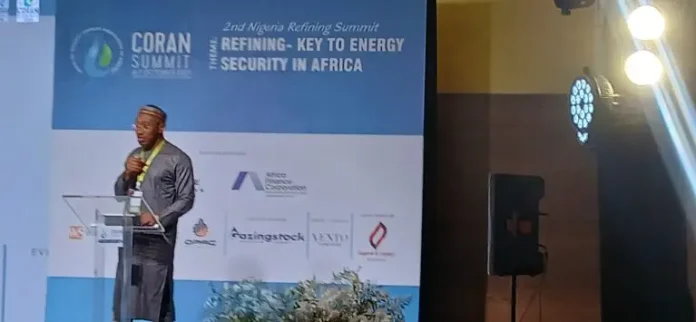News Investigators/ Minister of State for Petroleum Resources (Oil), Heineken Lokpobiri, says the Federal Government is determined to ensure that every barrel of crude produced in Nigeria adds real value at home and abroad.
He said this while speaking at the 2025 COREN Summit in Lagos on Tuesday.
Mr Lokpobiri, who was represented by his technical adviser, Ndah Adaba, said improving local refining capacity and energy security remains central to Nigeria’s development goals.
The theme of the summit is “Refinery – Key to Energy Security in Africa”.
It brought together engineers, policymakers, and energy professionals from across the continent.
According to the minister, as part of a deliberate policy and broader strategy, the ‘Naira for Crude’ sales agreement will continue to play a vital role in reducing the cost of fuel production.
He added that it also help in mitigatinh exchange rate volatility, and supporting indigenous refining capacity.
Mr Lokpobiri stated that through the Nigerian Midstream and Downstream Petroleum Regulatory Authority (NMDPRA), the government had streamlined the licensing process, from the Licence to Establish, to Construct, and Operate.
This, he added, helps in ensuring that credible investors are supported rather than hindered by bureaucratic bottlenecks.
The minister noted “Beyond licensing, the government is also facilitating crude oil supply to domestic refiners through the effective implementation of the Domestic Crude Oil Supply Obligation (DSCO).
“No nation can claim energy independence without the ability to refine its own crude.
He noted that the timing of the summit is critical, as Nigeria, and Africa at large, faces a pivotal moment requiring bold action to ensure energy security, promote indigenous refining, and position the continent as a net exporter of petroleum products.
He said that under the Renewed Hope Agenda of President Bola Tinubu, indigenous refining had been identified as a key driver of energy independence, job creation, and industrial revitalisation.
“Today, we have seen indigenous success stories such as Dangote Refinery & Petrochemical, Waltersmith Petroman Refinery, and Aradel Holdings, among others.
“These demonstrate that Nigerians possess both the capacity and the will to refine Nigeria’s crude oil locally.
“These projects are more than just facilities; they symbolize confidence in our policy direction. We are committed to replicating such success across all oil-producing states,”Lokpobiri said.
In a move to expand Nigeria’s refining influence beyond its borderthehe added that the government had launched the West African Fuel Reference Market, aimed at positioning Nigeria as a regional hub for refining and petroleum product supply within the West African subregion.
“With increased domestic refining capacity, Nigeria will not only meet its internal demands but also become a reliable supplier to neighboring countries, reducing dependence on distant refineries and costly maritime imports.
“This aligns with the African Union’s vision for energy integration and intra-African trade under the African Continental Free Trade Area (AfCFTA),” he noted.
Looking ahead, Lokpobiri said the government would ensure feedstock security for all licensed refiners and deepen fiscal incentives to attract further investments.
He also highlighted ongoing efforts to enhance collaboration among the Ministry of Petroleum Resources, NMDPRA, NUPRC, and security agencies to combat crude theft, pipeline vandalism, and improve relationships with host communities.
The minister further stressed the need for African nations to collaborate on product exchange, logistics, and shared energy infrastructure.
“The path to Africa’s energy security runs through the gates of our refineries and the institutions that support them.
“The Federal Government remains fully committed to supporting indigenous refiners, strengthening regulatory institutions, and creating an enabling environment for sustainable growth in the downstream sector.
“Let this COREN Summit 2025 serve as a renewed call to industry players, regulators, investors, and policymakers—to unite in building an Africa that refines what it produces and powers its future through its own resources,” he said.
NAN
•


